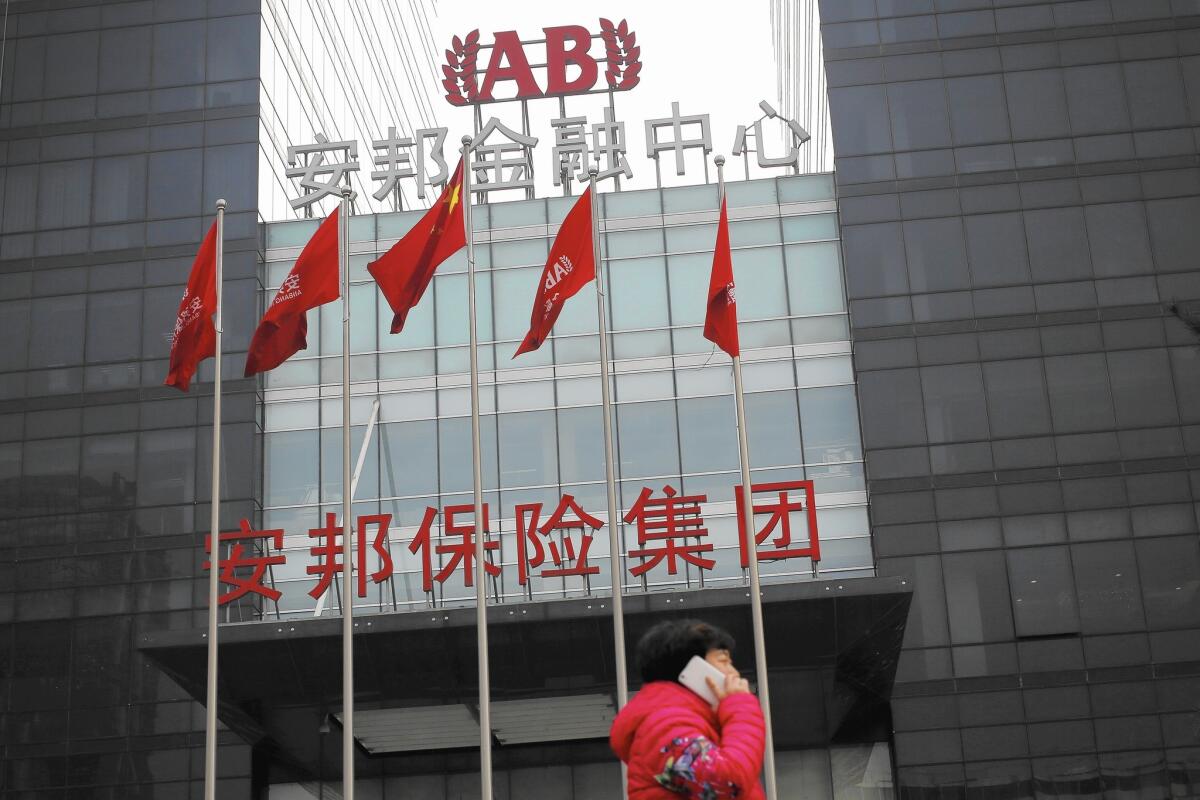Chinese investments in U.S. hotel companies spur national security scrutiny

Anbang Insurance Group in Beijing asked a U.S. interagency panel for review of its $1.95-billion acquisition of New York’s Waldorf-Astoria Hotel in 2014.
The surge in Chinese investments in U.S. hotel companies is starting to raise a question rarely heard in the world of commercial real estate: When does the ownership of a luxury hotel become a matter of national security?
Normally it’s not, which may be one reason that so much Chinese capital has been flooding into the U.S. real estate market, especially in California. Chinese bids for U.S. manufacturing, financial and technology companies have been on the rise, spurring more government national security reviews. Until recently, real estate deals haven’t raised the same political or security concerns. But that may be changing.
Although the U.S. has been the No. 1 target of Chinese investment capital in recent years, Chinese investment in the U.S. still pales in relation with that from other sources. China ranked only 14th in 2013, well behind such traditional leaders as Britain, Japan and Canada. Yet in recent years, Chinese deals have led the list of those scrutinized by the little-known Committee on Foreign Investment in the United States, or CFIUS, an interagency panel headed by the Treasury Department that screens foreign acquisitions of U.S. businesses for national security implications.
In 2012-14, according to the committee’s most recent annual report, 68 of the 358 transactions reviewed involved Chinese investors. In second place were 45 British deals — a smaller proportion of a much larger deal flow.
The committee can’t veto a deal on its own. But it can ask for modifications or, in extreme cases, refer a deal to the White House for a final ruling. China has had a discouraging record in such presidential reviews: President Obama blocked the purchase by Chinese-owned Ralls Corp. of several Oregon wind farm sites in 2012 on the grounds that some sites were located too close to a Naval weapons station. It was the first such veto since President George H.W. Bush ordered a Chinese government agency’s acquisition of Mamco, a Seattle aerospace firm, rescinded in 1990. Committee intervention can shut down deals even without White House intervention; in January, Philips blamed the review committee for the death of a deal to sell its lighting business, Lumileds, to a Chinese company.
Investment analysts and trade experts say the increase in the number of China deals referred for review mostly reflects the larger number of Chinese deals in the pipeline. But there’s little question that Chinese deals often attract especially close scrutiny. “The NSA or CIA might assess risks differently when it comes to China,” says Thilo Hanemann, a China specialist at Rhodium Group. “A greater number of Chinese deals are impacted because of a shift from fairly bread-and-butter deals to those involving cutting-edge technology, like semiconductors.”
Anne W. Salladin, an expert on the national security reviews at the law firm Stroock & Stroock & Lavan, adds that Chinese deals can provoke “heightened sensitivities” because they often involve companies with state ownership, “and the extent of state ownership is not always clear.” Additionally, Salladin says, “there is a history of espionage” by Chinese entities. On the other hand, she says, “the vast majority” of the deals presented by Chinese investors for review get through the process successfully.
Still, many Chinese are convinced that they’re being excessively scrutinized because of U.S. protectionism. Brookings Institution scholar David Dollar, has collected some of the critical references to the review process. A January 2014 article in the Chinese financial publication Caixin described CFIUS as “a mysterious committee that keeps confidential its investigation process, objection reason and legal explanation.” Members of Congress have demanded that CFIUS review even some seemingly innocuous deals, like last month’s announced sale of the Chicago Stock Exchange to a Chinese financial company. The exchange handles a bare one-half of 1% of U.S. stock trades.
Real estate deals typically haven’t been seen to warrant the committee’s scrutiny — “Hotels are generally not a sensitive area at all,” Hanemann says. That could play a role in the pace at which Chinese interest in U.S. real estate is accelerating. In 2014, Chinese investments in U.S. real estate came to $3.9 billion; in 2015 the total exceeded $10 billion.
Over the last two weeks alone, the once-obscure Anbang Insurance Group agreed to buy Strategic Hotels & Resorts, the owner of such properties as San Diego’s storied Hotel del Coronado, for $6.5 billion, and made an unsolicited bid for Starwood Hotels & Resorts Worldwide Inc., owner of the Westin and Sheraton brands, for $12.8 billion — outbidding Marriott International, which already had reached a deal to acquire Starwood. (Anbang raised its offer for Starwood by nearly $370 million Friday, bringing the total to more than $14 billion, and Starwood accepted it.) On Tuesday, Chinese hotel operator JE Group acquired the Hollywood Hills property that includes Yamashiro restaurant for $40 million, a price that hints at extensive redevelopment plans. In downtown L.A., work is underway on the massive three-building Fig Central hotel, retail and condo development owned by China’s Oceanwide Real Estate Group.
“Chinese companies want to diversify out of their own economy, which isn’t doing well and won’t get better for a long time,” says economist William Yu of the UCLA Anderson Forecast. “For them real estate is a good target because it’s stable, offers a long-term return, and they like big, beautiful buildings.”
Marriott, which owns little real estate, valued Starwood for its brand names and hotel management contracts. But Anbang may be in “a different place,” in the words of David Katz, lodging and gaming analyst at Telsey Advisory Group. Like sovereign wealth funds and private equity investors, it may hanker for the real estate and seek to keep or augment Starwood’s property portfolio.
Real estate deals may get even more scrutiny as Chinese investing expands. The review committee’s responsibility for national security concerns encompasses property whose proximity to government buildings or critical infrastructure could be considered a risk. Anbang asked for review of its $1.95-billion acquisition of New York’s Waldorf-Astoria Hotel in 2014, possibly recognizing that the hotel’s role as the official residence of the U.S. ambassador to the United Nations and the frequent lodging for U.S. and foreign dignitaries with business in New York made it a prime target of CFIUS review anyway. The committee approved the deal.
More such reviews are likely. “Anything with a line of sight to a major U.S. government entity or security facility … needs to be assessed by CFIUS,” Michael R. Wessel, a member of the congressional U.S.-China Economic and Security Review Commission, told Reuters after Anbang’s Starwood bid. What’s becoming increasingly clear is that until China’s own economy again looks promising enough to attract domestic investment, its capital will be heading here and the caseload for CFIUS is sure to get heavier.
Michael Hiltzik’s column appears every Sunday. Read his blog every day at latimes.com/business/hiltzik, reach him at [email protected], check out facebook.com/hiltzik and follow @hiltzikm on Twitter.
More to Read
Inside the business of entertainment
The Wide Shot brings you news, analysis and insights on everything from streaming wars to production — and what it all means for the future.
You may occasionally receive promotional content from the Los Angeles Times.











